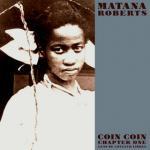
Matana Roberts Coin Coin Chapter One: Gens de Couleur Libres
(Constellation)
It might sound far-fetched that one record could change your mind about a whole genre of music, but you should keep reading, because Gens de Couleur Libres will make you like jazz. Any preconceptions you may have had about free jazz being complacent or noodly will be shattered: Coin Coin is a project so ambitious that to describe it makes it sound more like an art installation than an album. She does things with jazz I didn't think possible.
Gens de Couleur Libres is just part one of a 12-chapter cycle, although her themes of African American history and identity are so thoroughly explored in this chapter that it’s difficult to know where she’ll go next! This album was recorded live (it doesn’t suffer from this, in fact it benefits from the sheer energy of it) with a 16-person band, and Matana Roberts has actually been performing the first few chapters in jazz circles for a few years. Its eventual release has provided a welcome crossover to the avant-garde/post-rock scene; Roberts released this record on Canadian experimental rock label Constellation, home of Godspeed You! Black Emperor, with whom she has performed.
Chapter One alone spans across entire lives of slaves, with a loose focus on Marie Thérèse Metoyer (the titular Coincoin), a slave who, after bearing the children of a French merchant, was freed in 1778, eventually becoming wealthy enough to buy back and rescue her family of slaves. Along the way, Coincoin’s story blurs with other slaves and even Roberts’ own identity. It’s a challenging and often harrowingly provocative subject, as Roberts asks her audience "how much would you cost?", superimposing the unthinkable past onto the present day.
It’s quietly fascinating on paper, but what’s really unbelievable is the way these stories are delivered, tapping emotional depths beyond the surface of her historical subject. It begins with a wonderfully versatile, amorphous sax solo by Roberts, before her band slowly overtakes her, collectively improvising like busy traffic (so far so jazz). But what makes this record breathtaking is her vocals – Roberts begins the second movement, Pov Piti, with a primal, sub-linguistic babble that develops momentum and swells into a blood-curdling scream. She begins her narrative as Coincoin, recounting her scarring upbringing in a stream-of-consciousness spoken word, jumping about in an improvised lilt, hanging on words and then interrupting herself with anguished cries of “COIN COIN!”, and repeating “qua qua qua” in a homage to the similarly postmodern monologue of Lucky in Waiting for Godot. She never settles for less than jaw-dropping intensity.
Later on, Libation for Mr. Brown: Bid Em In uncomfortably juxtaposes an acapella spiritual-esque tune with a demoralising narrative of a slave auction, and things get even darker on I Am as Roberts repeats the anguished screams of Pov Piti with even more pain than before. Yet the album ends on a positive note, as Roberts dedicates the closer to her mother, and sings "celebrate life" – it feels oddly simplistic compared to the complex troubles it follows, but really it’s a relief to hear such an uplifting sentiment at the end, only adding to the record’s power.
There are intricacies to Gens de Couleur Libres I couldn’t touch upon, which is remarkable for a live recording. Not only does Roberts refuse to stick to one style of jazz, with her continually rotating structures, but she also denies any singular interpretation of her narrative, allowing a subjective appreciation that actually, in spite of the album’s wilfully hard-to-stomach intensity, will appeal to fans of art music of many different backgrounds. It really is rare that I get so wrapped up in a record; needless to say, I’m full of excitement for the future chapters.
